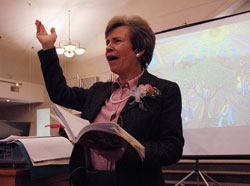Speaker: Bring gifts to your tasks and honor God in doing them

Author and inspirational speaker Kathy Coffey of Denver discusses ways to live an artful and faithful life on March 8 at St. Christopher Parish in Indianapolis. A painting by Los Angeles artist John August Swanson is displayed in the background. (Photo by Mary Ann Wyand)
By Mary Ann Wyand
Every person is God’s work of art.
Internationally known author and inspirational speaker Kathy Coffey of Denver discussed ways to live an artful and faithful life in her keynote address during the sixth annual Catholic Women’s Convocation on March 8 at St. Christopher Parish in Indianapolis.
Coffey based her talk for the Lenten day of reflection on a Scripture passage from St. Paul’s Letter to the Ephesians about how we are God’s work of art (Eph 2:10) as well as her new book, The Art of Faith, which examines how “art helps close the gap between faith and reality.”
Living “an authentic faith-filled life is an artwork,” she writes, that is “permeated by the astounding grace of God.”
Her book explains the process of how faith “invites us to bring all our gifts to our tasks and honor God in doing them.”
Coffey also describes how “art lifts us up to the beauty we were born for, … [and] reminds us that we belong to God and nothing less will ever fulfill us.”
She challenged the women to consider the influence of art in their faith journeys.
“All of what we do can be art,” she said, if it is done in positive, uplifting and nurturing ways.
“What looks like a mess,” she said, “has the makings of a Monet [painting].”
Because we are made in God’s image, Coffey said, “our truest nature is to create [beauty]. All great art is made in partnership with God.”
Art captures both the light and the dark in the human experience, she said, and faith helps us find our way in daily life.
“God pours into creation beauty and truth and goodness, making all creation a work of art,” Coffey explained. “Then God leaves a personal stamp on human beings because we are made in God’s image, and God crafts us with the same painstaking care that God made the solar system or the mountains or the oceans. So we thus become God’s work of art.”
Friendship is a form of art, she said, that creates beautiful memories.
When a close friend died, Coffey recalled, the woman’s friends carried her casket during the funeral, which was symbolic of how they had helped carry her throughout her cancer journey.
Gardening, cooking, sewing, exercise and even housework are creative acts, she said, comparable to traditional art forms of painting, sculpture, music and literature.
During a recent women’s faith-sharing discussion, Coffey said, her longtime friend, Iris, noted that, “Things that we have seen only as mundane chores actually celebrate our faith.”
Therese, another friend, cheerfully replied, “I will never again empty the dishwasher the same way. Now it’s a symphony.”
Another friend, Kathleen, said she believes that “faith has been bandied about a lot” in scientific ways, but now “we’re learning the art of faith.”
Reading from the Old Testament Book of Proverbs, Coffey asked the women to reflect on this passage: “The Lord created me at the beginning of his work, the first of his acts of long ago. … Before the mountains had been shaped, before the hills, I was brought forth. … When he established the heavens, I was there. … then I was beside him, like a master worker; and I was daily his delight, rejoicing before him always, Rejoicing in his inhabited world and delighting in the human race” (Prv 8:22, 25, 27, 30-31).
Then she asked the women to imagine “sitting next to God, being daily God’s delight, playing next to God.”
Consider the metaphor of a mother who is a potter and gives her child a lump of clay to play with while she is working, Coffey said, or a mother who is baking and offers her child a bit of dough to form into a pastry.
“I think that’s how we stand in relationship to God,” she said, “that we are the apprentices, and we play and we create and we delight beside God.”
St. Elizabeth Ann Seton had a difficult life after her husband died when she was 29, Coffey said. She raised their five children alone as well as her husband’s siblings. Two daughters died at young ages, and her sons were cause for worry.
“She concluded her life by saying, ‘I marvel not that I have lived, but that I have lived through it,’ ” Coffey said. “[Parenting] can be a work of art.”
A great Shakespearean play transforms tragedy into beauty, she said, and provides insight into mystery.
“How do we enter into mystery?” Coffey asked. “Through art and through spirituality.”
We need to make time for prayer and reflection so we can “stand back from the canvas” of life, she said, because when we’re too close we can’t see it clearly.
The complexity and beauty of human anatomy is truly a work of art, Coffey said. “God loves variety and paints with a whole spectrum of colors. Why would God be limited to just one?”
God intends for us to be Christ’s hands, heart and feet in this world, she said, and to give others a glimpse of divine beauty.
“One other art form that I think is accessible to all of us is the art of transformation,” she said. “… Another art we can all master is that of appreciation. … What are we grateful for?”
Nancy Meyer, a pastoral associate at the Indianapolis West Deanery parish, said Coffey’s presentation was “an enriching, creative way to look at how we go about faith, [how] … we are continuing to be created by God in faith.” †
